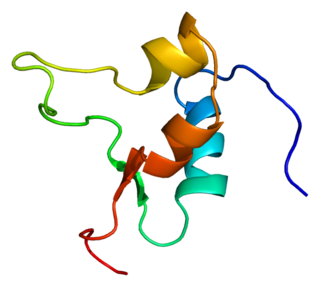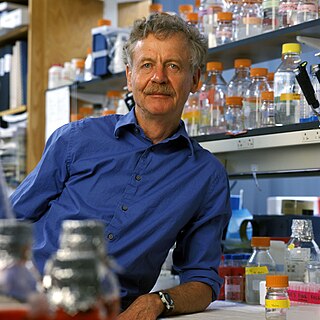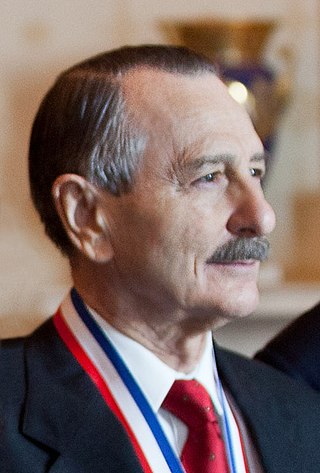Related Research Articles
Genomic imprinting is an epigenetic phenomenon that causes genes to be expressed or not, depending on whether they are inherited from the female or male parent. Genes can also be partially imprinted. Partial imprinting occurs when alleles from both parents are differently expressed rather than complete expression and complete suppression of one parent's allele. Forms of genomic imprinting have been demonstrated in fungi, plants and animals. In 2014, there were about 150 imprinted genes known in mice and about half that in humans. As of 2019, 260 imprinted genes have been reported in mice and 228 in humans.

Sir Martin John EvansFLSW is an English biologist who, with Matthew Kaufman, was the first to culture mice embryonic stem cells and cultivate them in a laboratory in 1981. He is also known, along with Mario Capecchi and Oliver Smithies, for his work in the development of the knockout mouse and the related technology of gene targeting, a method of using embryonic stem cells to create specific gene modifications in mice. In 2007, the three shared the Nobel Prize in Physiology or Medicine in recognition of their discovery and contribution to the efforts to develop new treatments for illnesses in humans.

Insulin-like growth factor 2 (IGF-2) is one of three protein hormones that share structural similarity to insulin. The MeSH definition reads: "A well-characterized neutral peptide believed to be secreted by the liver and to circulate in the blood. It has growth-regulating, insulin-like and mitogenic activities. The growth factor has a major, but not absolute, dependence on somatotropin. It is believed to be a major fetal growth factor in contrast to insulin-like growth factor 1 (IGF-1), which is a major growth factor in adults."
An insulator is a type of cis-regulatory element known as a long-range regulatory element. Found in multicellular eukaryotes and working over distances from the promoter element of the target gene, an insulator is typically 300 bp to 2000 bp in length. Insulators contain clustered binding sites for sequence specific DNA-binding proteins and mediate intra- and inter-chromosomal interactions.

Rudolf Jaenisch is a Professor of Biology at MIT and a founding member of the Whitehead Institute for Biomedical Research. He is a pioneer of transgenic science, in which an animal’s genetic makeup is altered. Jaenisch has focused on creating genetically modified mice to study cancer, epigenetic reprogramming and neurological diseases.

Dame Anne Laura Dorinthea McLaren, was a British scientist who was a leading figure in developmental biology. She paved the way for women in science and her work helped lead to human in vitro fertilisation (IVF). She left an enduring legacy marked by her research and ethical contributions to the field. She received many honors for her contributions to science, including election as fellow of the Royal Society.

Transcriptional repressor CTCF also known as 11-zinc finger protein or CCCTC-binding factor is a transcription factor that in humans is encoded by the CTCF gene. CTCF is involved in many cellular processes, including transcriptional regulation, insulator activity, V(D)J recombination and regulation of chromatin architecture.

Ralph Lawrence Brinster is an American geneticist, National Medal of Science laureate, and Richard King Mellon Professor of Reproductive Physiology at the School of Veterinary Medicine, University of Pennsylvania.

H19 is a gene for a long noncoding RNA, found in humans and elsewhere. H19 has a role in the negative regulation of body weight and cell proliferation. This gene also has a role in the formation of some cancers and in the regulation of gene expression.

Transcriptional repressor CTCFL also known as BORIS is a protein that in humans is encoded by the CTCFL gene.
Edith Heard is a British-French researcher in epigenetics who has been serving as the Director General of the European Molecular Biology Laboratory (EMBL) since January 2019. She is also Professor at the Collège de France, holding the Chair of Epigenetics and Cellular Memory. In 2025 she will become CEO of the Francis Crick Institute in London, U.K.

Wolf Reik FRS is a German-British molecular biologist and an honorary group leader at the Babraham Institute, honorary professor of Epigenetics at the University of Cambridge and associate faculty at the Wellcome Trust Sanger Institute. He was announced as the director of Altos Labs Cambridge Institute when the company launched on 19 January 2022.
Epigenetics of human development is the study of how epigenetics effects human development.
Katharine Luisa Arney is a British science communicator, broadcaster, author, and the founder and creative director of communications consultancy First Create the Media. She was a regular co-host of The Naked Scientists, a BBC Radio programme and podcast, and also hosted the BBC Radio 5 Live Science Show and the BBC Radio 4 series Did the Victorians Ruin the World She has written numerous articles and columns for Science, The Guardian, New Scientist the BBC and others.

Anne Carla Ferguson-Smith is a mammalian developmental geneticist. She is the Arthur Balfour Professor of Genetics and Pro-Vice Chancellor for Research and International Partnerships at the University of Cambridge. Formerly head of the Department of Genetics at the University of Cambridge, she is a Fellow of Darwin College, Cambridge and serves as President of the Genetics Society.
Azim Surani is a Kenyan-British developmental biologist who has been Marshall–Walton Professor at the Wellcome Trust/Cancer Research UK Gurdon Institute at the University of Cambridge since 1992, and Director of Germline and Epigenomics Research since 2013.
Davor Solter is a Yugoslavian-born developmental biologist, particularly known for his pioneering work on mammalian genomic imprinting. He is Emeritus Member and Director, Max Planck Institute of Immunobiology and Epigenetics; Visiting International Professor, Siriraj Center for Excellence in Stem Cell Research, Mahidol University, Thailand; and Visiting Professor, University of Zagreb Medical School.
Susan R. Weiss is an American microbiologist who is a Professor of Microbiology at the Perelman School of Medicine at the University of Pennsylvania. She holds vice chair positions for the Department of Microbiology and for Faculty Development. Her research considers the biology of coronaviruses, including SARS, MERS and SARS-CoV-2. As of March 2020, Weiss serves as Co-Director of the University of Pennsylvania/Penn Medicine Center for Research on Coronavirus and Other Emerging Pathogens.
Folami Ideraabdullah is an American geneticist and assistant professor in the Department of Genetics and the Department of Nutrition at the Gillings School of Global Public Health at the University of North Carolina at Chapel Hill. Ideraabdullah explores how maternal nutrition and environmental toxin exposure affect development through exploring epigenetic changes to DNA. She has found that maternal Vitamin D deficiencies can cause genome-wide changes in methylation patterns that persist for several generations and impact offspring health. Her international collaboration with the University of Witwatersrand represents the first time that metal levels in the placenta have been investigated in relation to birth outcomes in South Africa.
Hongjun Song is a Chinese-American neurologist and stem cell biologist. He is the Perelman Professor of Neuroscience in the Perelman School of Medicine's Department of Neuroscience and co-director of the Institute for Regenerative Mediacine Neurodevelopment and Regeneration Program. In 2020, Song was elected a Member of the National Academy of Medicine for "revealing unexpected dynamics and plasticity of the neuronal epigenome, as well as its functions under physiological and pathological conditions."
References
- 1 2 3 4 "Marisa S. Bartolomei | Faculty | About Us | Perelman School of Medicine | Perelman School of Medicine at the University of Pennsylvania". www.med.upenn.edu. Retrieved 2021-04-28.
- 1 2 3 Ward, Monika A (2018-02-01). "An interview with Dr Marisa Bartolomei". Biology of Reproduction. 98 (2): 147–149. doi: 10.1093/biolre/iox170 . ISSN 0006-3363. PMID 29228104.
- ↑ Bartolomei, Marisa S (1987). Genetic analysis of the Mouse RNA polymerase II largest subunit (Thesis). OCLC 82693809.
- ↑ "Marisa S. Bartolomei-Marisa S.-1987 – Hopkins BCMB" . Retrieved 2021-04-28.
- 1 2 Nybo, Kristie (May 2010). "Profile of Marisa S. Bartolomei: Professor, Department of Cell and Developmental Biology, University of Pennsylvania School of Medicine, Philadelphia, PA, USA". BioTechniques. 48 (5): 357. doi: 10.2144/000113414 . ISSN 0736-6205.
- 1 2 3 4 "Marisa Bartolomei, Ph.D." Penn Epigenetics Institute. Retrieved 2021-04-28.
- ↑ "Penn Scientist receives first annual prize for scientific contributions to women's health". EurekAlert!. Retrieved 2021-04-28.
- ↑ "Marisa Bartolomei Receives Endowed Professorship – Cell and Developmental Biology @ U Penn" . Retrieved 2021-04-28.
- ↑ "New AAAS Fellows Recognized for Their Contributions to Advancing Science | American Association for the Advancement of Science". www.aaas.org. Retrieved 2021-04-28.
- ↑ "Penn Medicine Faculty Named to 2014 Class of AAAS Fellows - Penn Medicine". www.pennmedicine.org. Retrieved 2021-04-28.
- ↑ "Genetics Society Medal 2017". Genetics Society. Retrieved 2021-04-28.
- ↑ "2021 NAS Election". www.nasonline.org. Retrieved 2021-04-28.